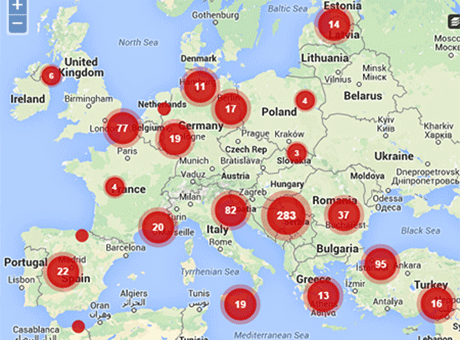29 Apr 2015 | Azerbaijan, Azerbaijan News, Europe and Central Asia, mobile
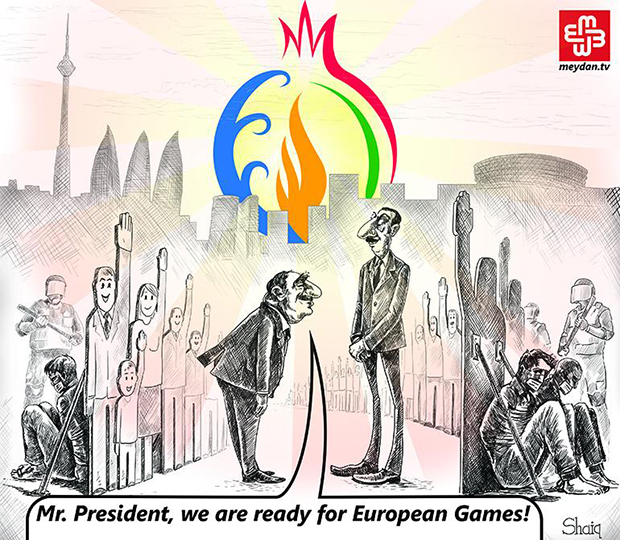
Editorial cartoon on the Baku European Games From Meydan TV (Image: Meydan TV)
In six weeks, the inaugural European Olympic Committee (EOC)-backed European Games will start in Azerbaijan’s capital Baku. Meanwhile, concerns about the human rights situation in the country are mounting. The latest chapter in the ongoing crackdown on government critics saw pro-democracy activist Rasul Jafarov and human rights lawyer Intigam Aliyev sentenced to 6.5 and 7.5 years in prison, respectively.
Against this backdrop, Index on Censorship, Human Rights Watch and Article 19 on 28 April hosted Give Human Rights a Sporting Chance in Azerbaijan at the Frontline Club in London. The event addressed the question of how journalists can effectively cover the games given the full scope of social and political issues in Azerbaijan.
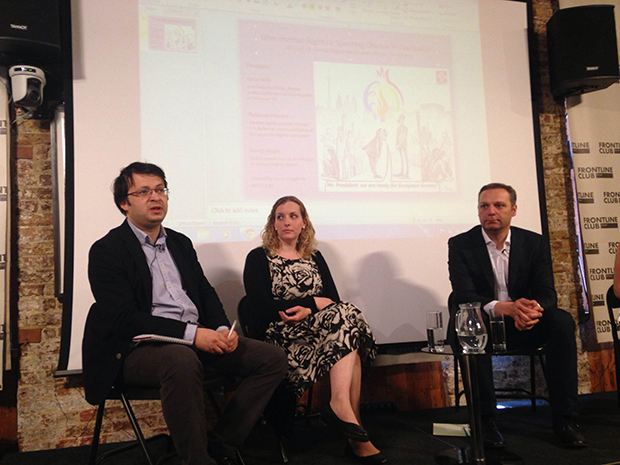
From left: Emin Milli, Rebecca Vincent and Giorgi Gogia speaking speaking on the crackdown on government critics in Azerbaijan ahead of this summer’s Baku European Games (Photo: Index on Censorship)
On the panel were Emin Milli, a former political prisoner in Azerbaijan, now director of Meydan TV; Rebecca Vincent, coordinator of the Sport for Rights campaign; and Giorgi Gogia, Human Rights Watch’s senior researcher on Azerbaijan who was recently denied entry into the country. These were some of their key points:
1) Azerbaijan’s human rights community has been all but wiped out over the past year
2) In light of the human rights situation in Azerbaijan, the EOC is not free of responsibility…
3) …and neither are European states
4) The Azerbaijani government has invested in an international PR campaign — and it’s working
5) The games are not popular among ordinary Azerbaijanis
6) Sports journalists should report on more than just sports during the games
7) Despite Azerbaijan’s current climate, human rights activism remains important and worthwhile
This article was posted on 29 April 2015 at indexoncensorship.org
28 Apr 2015 | Events, mobile
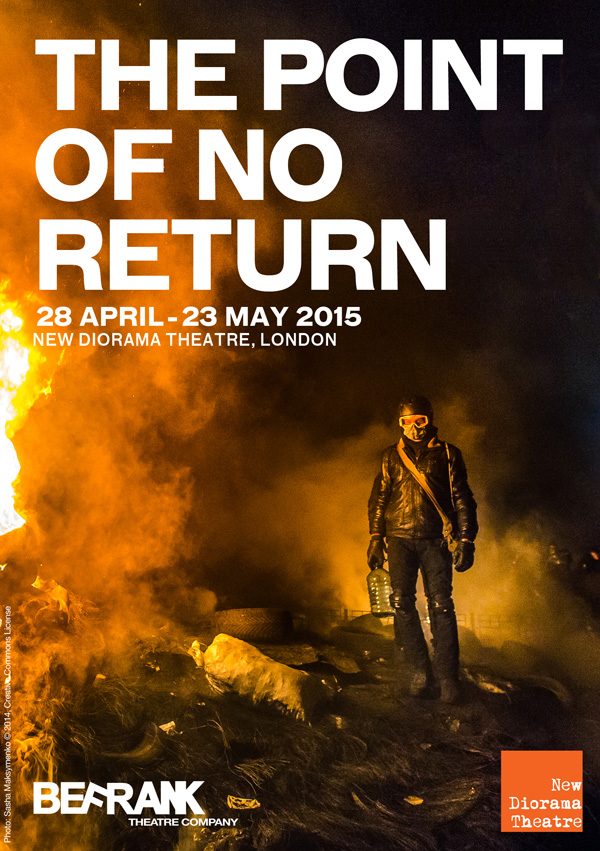
The Point of No Return, a new play based upon the last four days of Ukraine’s Maidan protests. From personally recorded real-life stories, extensive research and a journey to the heart of Ukraine, this story is based upon the revolution in Kiev in January-February 2014.
The performance on 6 May will be followed by a discussion including Jodie Ginsberg, CEO of Index on Censorship:
- How important is freedom of speech to democracy?
- What form did censorship take in the Ukrainian revolution?
- How is censorship happening in the UK today?
Index joins BeFrank Theatre Company for an evening of debate and discussion about the future of free speech in the UK, Ukraine and across the world.
Where: New Diorama Theatre, London (Nearest Tube: Warren St)
When: Wednesday 6 May 2015, 7.30pm
Tickets: £12-£15 / Book here
An earlier version of this event provided the wrong date. It takes place on 6 May.
28 Apr 2015 | Campaigns, Events, mobile
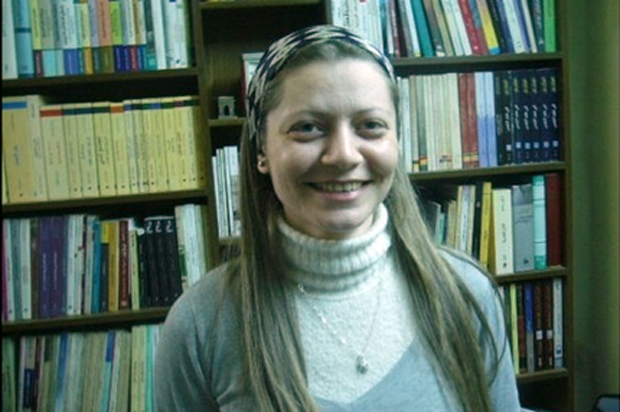
Razan Zaitouneh, above, Samira Khalil, Nazem Hamadi and Wa’el Hamada were abducted on 9 December 2013
To mark the 38th birthday (on April 29) of missing human rights defender and lawyer Razan Zaitouneh, head of the Violations Documentation Centre in Syria (VDC), winner of the 2011 Sakharov Prize for Freedom of Thought and the 2011 Anna Politkovskaya Award of RAW in WAR (Reach All Women In War), the undersigned human rights organizations today reiterate their call for her immediate release, as well as that of her missing colleagues Samira Khalil, Nazem Hamadi and Wa’el Hamada.
On December 9, 2013, the four human rights defenders, collectively known as the “Duma Four”, were abducted during a raid by a group of armed men on the offices of the VDC in Duma, near Damascus. There has been no news of their whereabouts or health since.
The VDC is active in monitoring and reporting on human rights violations in Syria and the undersigned organizations believe that the abduction of the four activists was a direct result of their peaceful human rights work. Their ongoing detention forms part of a wider pattern of threats and harassment by both government forces and non-state actors seeking to prevent human rights defenders exposing abuses.
In the months prior to her abduction Razan Zaitouneh wrote about threats she had been receiving and informed human rights activists outside Syria that they originated from local armed groups in Duma. The most powerful armed group operating in Duma at the time of the abductions is the Army of Islam headed by Zahran Alloush. In April 2014, Razan Zaitouneh’s family issued a statement saying they held Zahran Alloush responsible for her and her colleagues’ wellbeing given the large presence his group maintained in the area.
The undersigned organizations, as well as other activists, have been calling for the release of the “Duma Four” since their abductions. Today they again urge the Army of Islam and other armed groups operating in the area to take immediate steps to release the abducted VDC staff, or investigate their abduction and work for their release. They further urge governments that support these groups, as well as religious leaders and others who may have influence over them, to press for such action, in accordance with United Nations Security Council Resolution 2139, which “strongly condemns” the abduction of civilians and demands and immediate end to this practice.
Razan Zaitouneh has been one of the key lawyers defending political prisoners in Syria since 2001. She has played a key role in efforts to defend the universality of human rights and support independent groups and activists in Syria. Along with a number of other activists, she established the VDC and co-founded the Local Coordination Committees (LCCs), which co-ordinate the work of local committees in various cities and towns across Syria. She also established the Local Development and Small Projects Support Office, which assists non-governmental organizations in besieged Eastern Ghouta.
Samira Khalil has been a long-time political activist in Syria and had been detained on several occasions by the Syrian authorities as a result of her peaceful activism. Before her abduction, she was working to help women in Duma support themselves by initiating small income-generating projects. Wa’el Hamada, an active member of the VDC and co-founder of the LCC network had also been detained by the Syrian authorities. Before his abduction he was working, together with Nazim Hamadi, to provide humanitarian assistance to the residents of besieged Eastern Ghouta.
Signatories:
Alkarama Foundation
Amman Center for Human Rights Studies
Amnesty International
Arab Foundation for Development and Citizenship
Arab Network for Human Rights Information (ANHRI)
Arab Organization for Human Rights in Syria
Badael Foundation
Bahrain Centre for Human Right
Defending prisoners of conscience in Syria Organization
Cairo Center for Development (CCD)
Canadian Journalists for Free Expression (CJFE)
Centre for Democracy and Civil Rights in Syria
Committees for the Defending Democratic Freedoms and Human Rights in Syria
El-Nadeem Center for Rehabilitation of Victims of Violence
Enmaa Center for Democracy and Human Rights
Fraternity Center for Democracy and civil society
Front Line Defenders (FLDs)
Freedom House
Gulf Center for Human Rights
Human Rights Fist Society , Saudi Arabia
Human Rights Organization in Syria – MAF
Human Rights watch (HRW)
Humanist Institute for Co-operation with Developing Countries (HIVOS)
Hand in Hand Organization , Syria
Monitor for Human Rights in Saudi Arabia
Index on Censorship
International Media Support (IMS)
International Centre for Supporting Rights and Freedoms
International Civil Society Action Network (ICAN)
International Service For Human Rights (ISHR)
The Tunisian Initiative for Freedom of Expression
Institute for War and Peace Reporting (IWPR)
International Federation for Human Rights (FIDH) under the Observatory for the Protection of Human Rights Defenders
Iraqi Women Network
Iraqi Journalists Rights Defense Association(IJRDA)
Iraqi Network for social Media
Kurdish Committee for Human Rights in Syria (observer)
Kurdish Organization for Human Rights in Syria (DAD)
Kvinna till Kvinna Foundation
Lawyers for Lawyers
Lulua Center for Human Rights
Madad NGOs
Maharat Foundation
MENA Media Monitoring group
Metro Centre to Defend Journalists in Iraqi Kurdistan
National Organization for Human Rights in Syria
Nazra for Feminist Studies
No Peace Without Justice (NPWJ)
One World Foundation (OWF)
Omani Observatory for Human Rights
World Organization Against Torture (OMCT) under the Observatory for the Protection of Human Rights Defenders
Pax for Peace – Netherland
Pen International
Reach All Women in War (RAW)
Reporters Without Boarders (RSF)
Sentiel Human Rights Defenders
Syrian American Council (SAC)
Syrian Center for Media and Freedom of Expression (SCM)
Syrian Center for Legal Researches & Studies
Syrian Journalists Association
Syrian Network for Human Rights (SNHR)
Syrian League for Citizenship
Violations Documentation Center in Syria (VDC)
Yemeni organization for defending human rights and democratic freedom
28 Apr 2015 | Counter Terrorism, Digital Freedom, Germany, mobile, News and features, United Kingdom, United States

(Illustration: Shutterstock)
Wrestling with his fear about Googling the composition of a carbon dioxide bomb after hearing of a failed bombing at LAX, Frankfurter Allgemeine Zeitung journalist, Peter Galison highlights one of the threats of mass surveillance to journalistic practice, “The knowledge that I might be walking into a security word search had been enough to make me hesitate.”
Following Edward Snowden’s leaks outlining the capabilities of intelligence agencies around the world to monitor, track and collate private online communications this moment of hesitation before tackling a story has become a major concern to journalists globally.
Pen International surveyed 772 fiction and non-fiction writers and found out that more than 1 in 3 writers in so-called free countries (34%) said they had avoided writing or speaking on a particular topic following the NSA revelations.
While Ryan Gallagher of The Intercept states “self-censorship is never the only available option” he acknowledges that his practices have changed:
“In the post-Snowden environment I definitely use encryption tools much more to communicate with people, mainly because more of my colleagues and contacts have now adopted these tools. It’s no longer a niche thing…the Snowden revelations were a big wake-up call for people.”
Encryption and anonymity software have emerged as the primary set of tools available to journalists to protect themselves, their stories and their sources. Indeed in the light of the leaked information, they have taken on added significance; the ability to depend on robust communication security may be the difference between coverage and self-censorship.
Jillian York, director for international freedom of expression at the Electronic Frontier Foundation outlines this central anxiety: “I’ve spoken to journalists who, upon realizing the extent of the NSA’s surveillance, have changed their practices. Some have adopted encryption…while others say they are afraid to cover certain topics.”
This tension between technical literacy and forms of self-censorship defines journalism in the mass surveillance age. As Cyrus Farivar of Ars Technica writes: “less tech-literate journalists may not even be aware of the threats that they may or may not face”.
The advent of blogging and social media, as well as the increase of citizen journalism around the world has enabled a diverse range of voices to join the debate around key issues but as Chris Frost, the chair of the ethics council at the National Union of Journalists (NUJ) states, this can expose many more people to the threat of mass surveillance: “Freelance journalists, citizen journalists and bloggers would need to be sure that they have the technical know-how to safeguard their sources and understand the potential risks involved.”
Are key issues being avoided by those unable to guarantee total security in their communications? And if this is the case, what voices are being silenced?
This is not a threat for journalists alone. For Chris Frost and the NUJ, security and anonymity for sources is paramount: “Without the protection of sources, some people will refuse to speak to the media, for fear of being exposed.” As Ryan Gallagher says: “Quite simply, we don’t have a choice. We must protect our sources and we can’t do that if we don’t change the way we operate online.”
The ability of journalists to protect information from the state is also a vital step in protecting themselves when reporting in conflict zones. As Chris Frost writes, “if journalists are perceived as informers to the authorities, or as future witnesses in a trial, they can become a target.” Mass surveillance is a central tool for states to acquire and share information with its intelligence partners around the world. Implicating journalists as the source of the leak further endangers their safety and therefore their willingness to cover certain issues, as Ryan Gallagher articulates: “Some people may find it too daunting and just steer clear.”
The first principle on the International Federation of Journalists’ Declaration of Principles is “Respect for truth and for the right of the public to truth is the first duty of the journalist”, and this highlights the divergent interests of the state and the media. Where truth is withheld by the state, often in the name of “national security”, the role and responsibilities of journalists in informing the public is brought to the fore. Mass surveillance technologies are powerful tools for states to hinder and restrict this process, manipulating the media landscape to benefit their own aims and objectives at the expense of an informed and engaged civil society.
How journalists learn to navigate this landscape will determine their continued willingness and ability to report on sensitive issues, defending journalism in the public interest across the globe.
But, as Ryan Gallagher reminds us, this willingness is not easily defeated: “Thankfully there are a lot of courageous reporters in the world who will work to get out important information to the public no matter what. So fear will never be completely effective at shutting down media coverage.”
World Press Freedom Day 2015
• Media freedom in Europe needs action more than words
• Dunja Mijatović: The good fight must continue
• Mass surveillance: Journalists confront the moment of hesitation
• The women challenging Bosnia’s divided media
• World Press Freedom Day: Call to protect freedom of expression
This article was posted on 28 April 2015 at indexoncensorship.org






